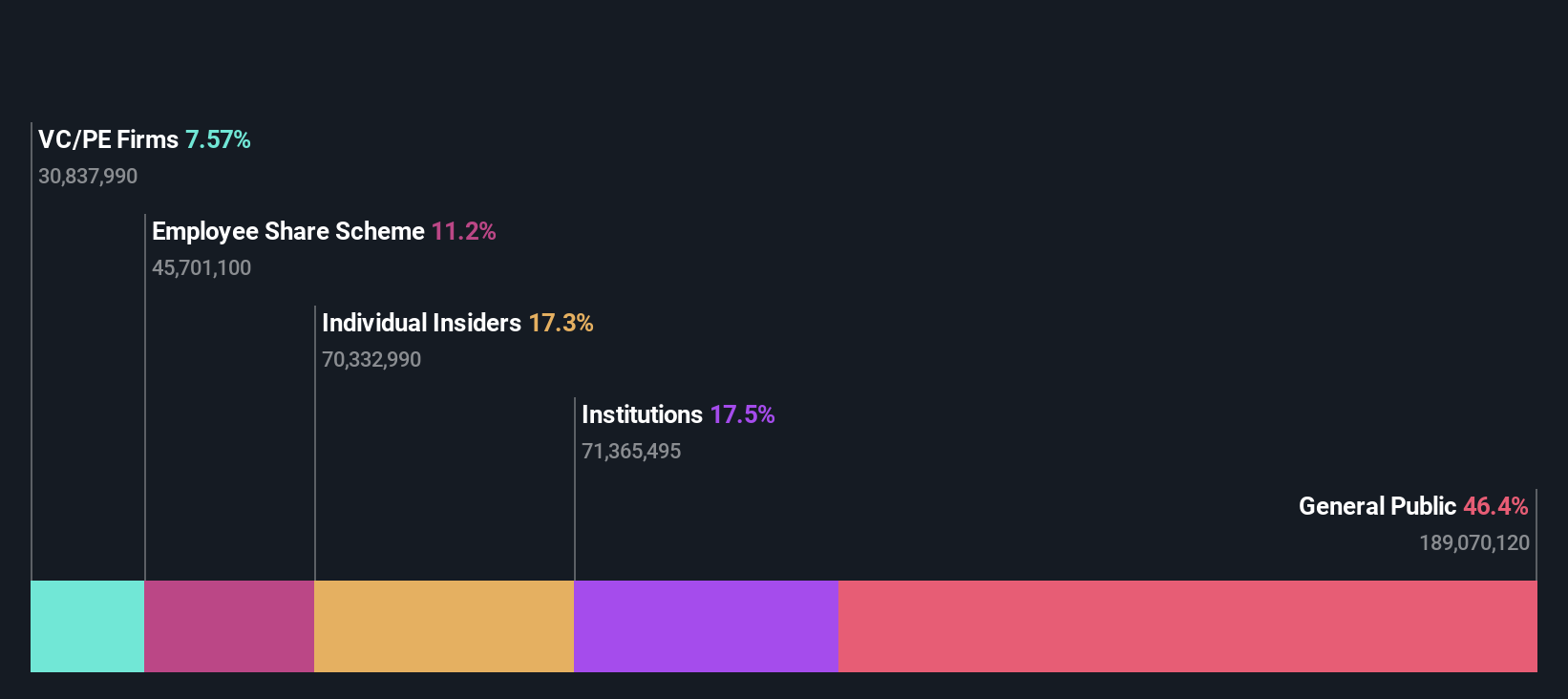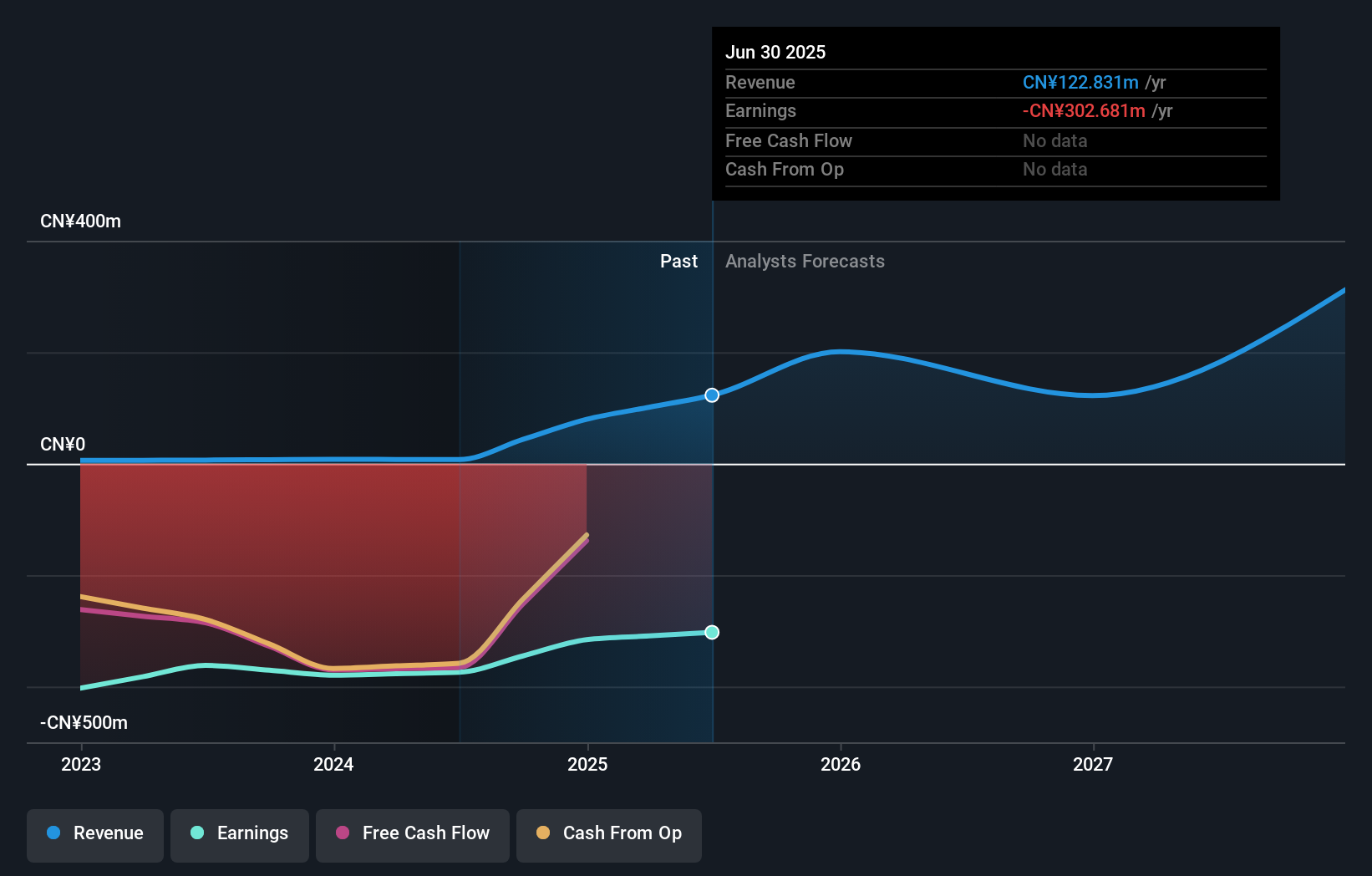ImmuneOnco Biopharmaceuticals (Shanghai) Inc.'s (HKG:1541) 9.3% loss last week hit both individual investors who own 46% as well as institutions
Key Insights
- ImmuneOnco Biopharmaceuticals (Shanghai)'s significant retail investors ownership suggests that the key decisions are influenced by shareholders from the larger public
- The top 8 shareholders own 52% of the company
- Insider ownership in ImmuneOnco Biopharmaceuticals (Shanghai) is 17%
A look at the shareholders of ImmuneOnco Biopharmaceuticals (Shanghai) Inc. (HKG:1541) can tell us which group is most powerful. We can see that retail investors own the lion's share in the company with 46% ownership. In other words, the group stands to gain the most (or lose the most) from their investment into the company.
While institutions, who own 18% shares weren’t spared from last week’s HK$452m market cap drop, retail investors as a group suffered the maximum losses
In the chart below, we zoom in on the different ownership groups of ImmuneOnco Biopharmaceuticals (Shanghai).
See our latest analysis for ImmuneOnco Biopharmaceuticals (Shanghai)

What Does The Institutional Ownership Tell Us About ImmuneOnco Biopharmaceuticals (Shanghai)?
Institutions typically measure themselves against a benchmark when reporting to their own investors, so they often become more enthusiastic about a stock once it's included in a major index. We would expect most companies to have some institutions on the register, especially if they are growing.
As you can see, institutional investors have a fair amount of stake in ImmuneOnco Biopharmaceuticals (Shanghai). This suggests some credibility amongst professional investors. But we can't rely on that fact alone since institutions make bad investments sometimes, just like everyone does. It is not uncommon to see a big share price drop if two large institutional investors try to sell out of a stock at the same time. So it is worth checking the past earnings trajectory of ImmuneOnco Biopharmaceuticals (Shanghai), (below). Of course, keep in mind that there are other factors to consider, too.

ImmuneOnco Biopharmaceuticals (Shanghai) is not owned by hedge funds. Looking at our data, we can see that the largest shareholder is the CEO Wenzhi Tian with 17% of shares outstanding. ImmuneOnco Biopharmaceuticals (Shanghai) Inc. , ESOP is the second largest shareholder owning 11% of common stock, and Shanghai Yongkan Investment Management Co., Ltd. holds about 7.6% of the company stock.
On further inspection, we found that more than half the company's shares are owned by the top 8 shareholders, suggesting that the interests of the larger shareholders are balanced out to an extent by the smaller ones.
Researching institutional ownership is a good way to gauge and filter a stock's expected performance. The same can be achieved by studying analyst sentiments. There is some analyst coverage of the stock, but it could still become more well known, with time.
Insider Ownership Of ImmuneOnco Biopharmaceuticals (Shanghai)
While the precise definition of an insider can be subjective, almost everyone considers board members to be insiders. Company management run the business, but the CEO will answer to the board, even if he or she is a member of it.
Most consider insider ownership a positive because it can indicate the board is well aligned with other shareholders. However, on some occasions too much power is concentrated within this group.
Our information suggests that insiders maintain a significant holding in ImmuneOnco Biopharmaceuticals (Shanghai) Inc.. Insiders have a HK$762m stake in this HK$4.4b business. It is great to see insiders so invested in the business. It might be worth checking if those insiders have been buying recently.
General Public Ownership
The general public-- including retail investors -- own 46% stake in the company, and hence can't easily be ignored. This size of ownership, while considerable, may not be enough to change company policy if the decision is not in sync with other large shareholders.
Private Equity Ownership
With a stake of 7.6%, private equity firms could influence the ImmuneOnco Biopharmaceuticals (Shanghai) board. Some investors might be encouraged by this, since private equity are sometimes able to encourage strategies that help the market see the value in the company. Alternatively, those holders might be exiting the investment after taking it public.
Next Steps:
It's always worth thinking about the different groups who own shares in a company. But to understand ImmuneOnco Biopharmaceuticals (Shanghai) better, we need to consider many other factors. Consider for instance, the ever-present spectre of investment risk. We've identified 1 warning sign with ImmuneOnco Biopharmaceuticals (Shanghai) , and understanding them should be part of your investment process.
If you would prefer discover what analysts are predicting in terms of future growth, do not miss this free report on analyst forecasts.
NB: Figures in this article are calculated using data from the last twelve months, which refer to the 12-month period ending on the last date of the month the financial statement is dated. This may not be consistent with full year annual report figures.
Have feedback on this article? Concerned about the content? Get in touch with us directly. Alternatively, email editorial-team (at) simplywallst.com.
This article by Simply Wall St is general in nature. We provide commentary based on historical data and analyst forecasts only using an unbiased methodology and our articles are not intended to be financial advice. It does not constitute a recommendation to buy or sell any stock, and does not take account of your objectives, or your financial situation. We aim to bring you long-term focused analysis driven by fundamental data. Note that our analysis may not factor in the latest price-sensitive company announcements or qualitative material. Simply Wall St has no position in any stocks mentioned.
Contact Us
Contact Number : +852 3852 8500Service Email : service@webull.hkBusiness Cooperation : marketinghk@webull.hkWebull Securities Limited is licensed with the Securities and Futures Commission of Hong Kong (CE No. BNG700) for carrying out Type 1 License for Dealing in Securities, Type 2 License for Dealing in Futures Contracts and Type 4 License for Advising on Securities.

English